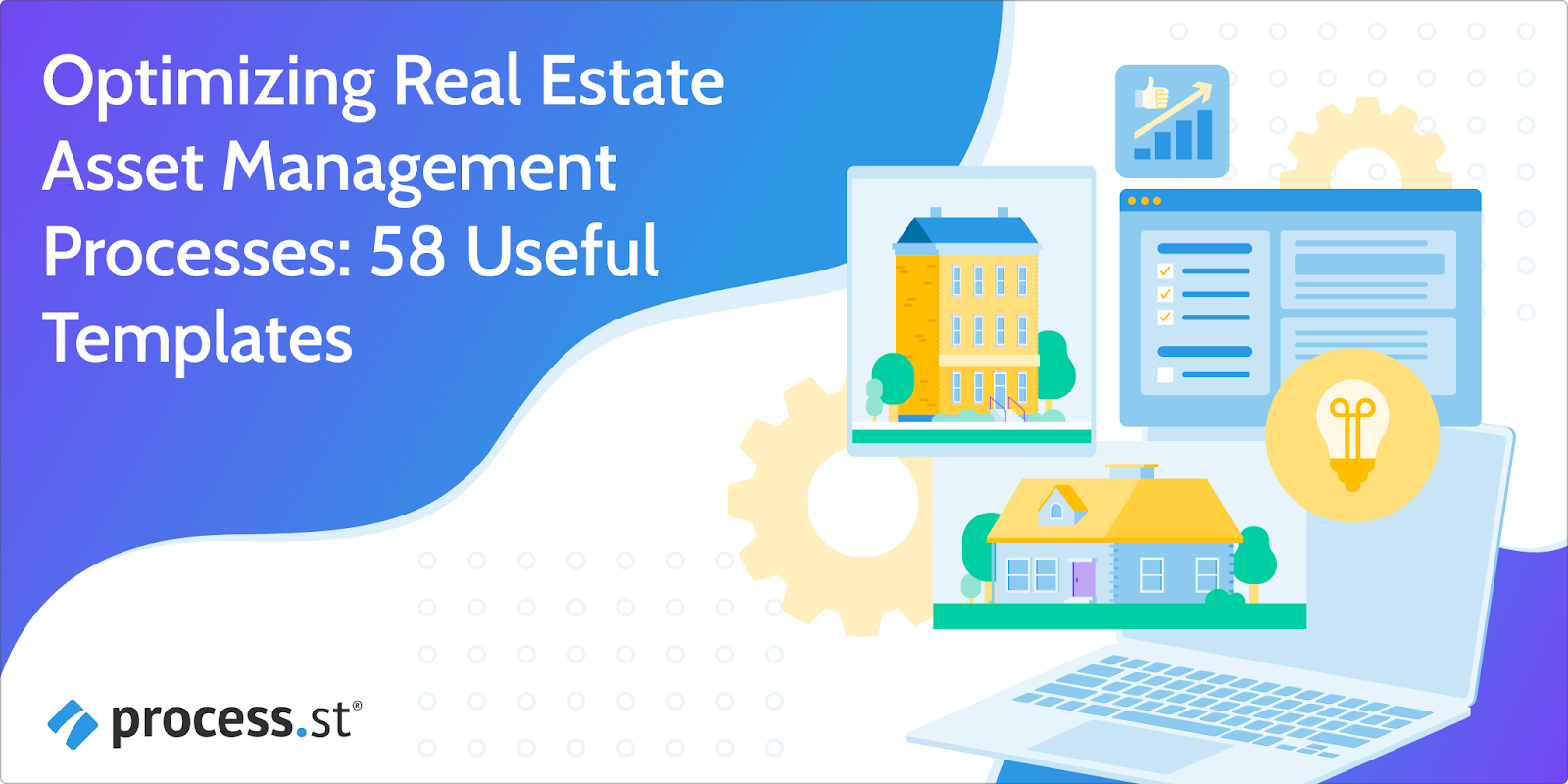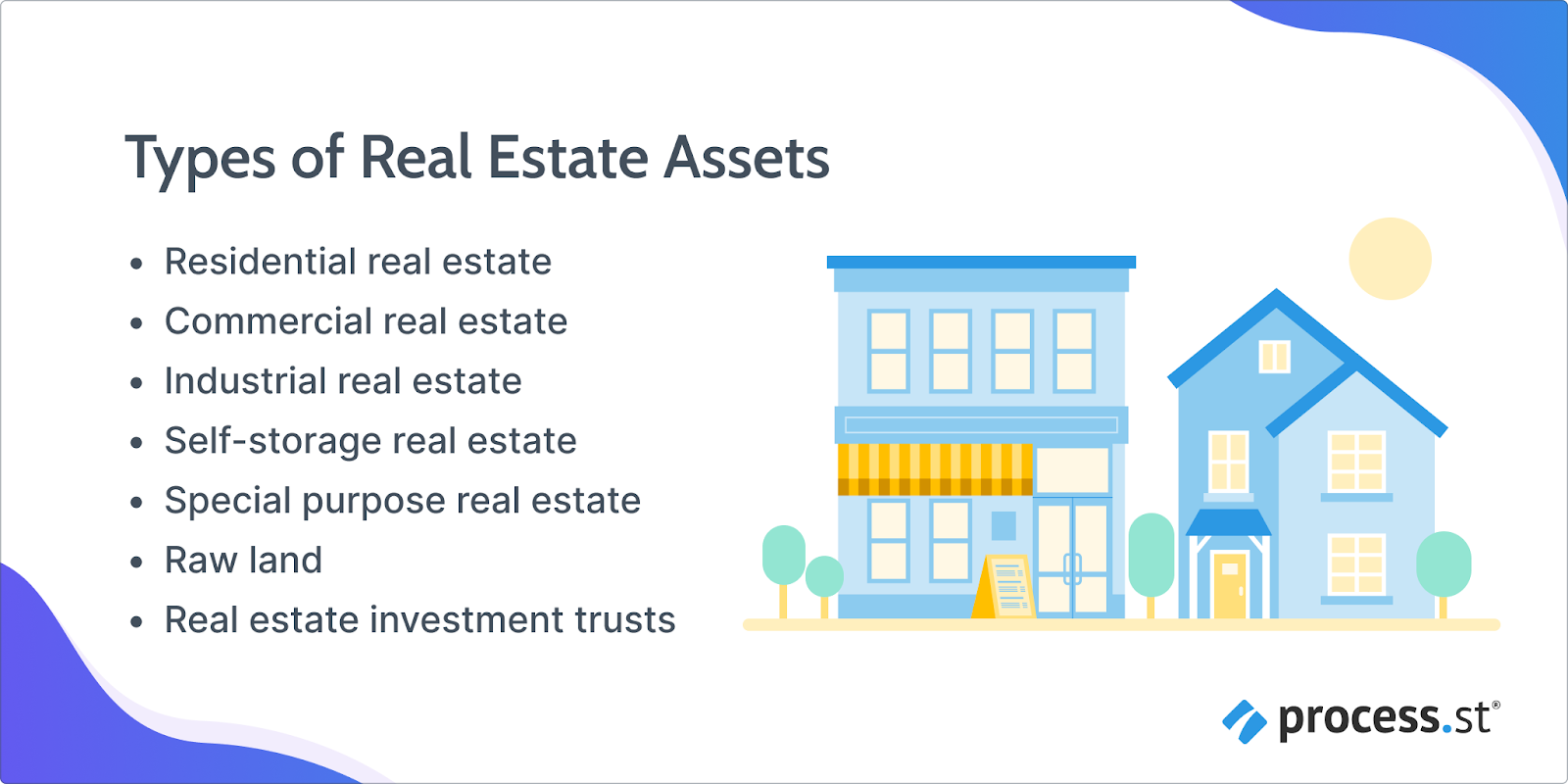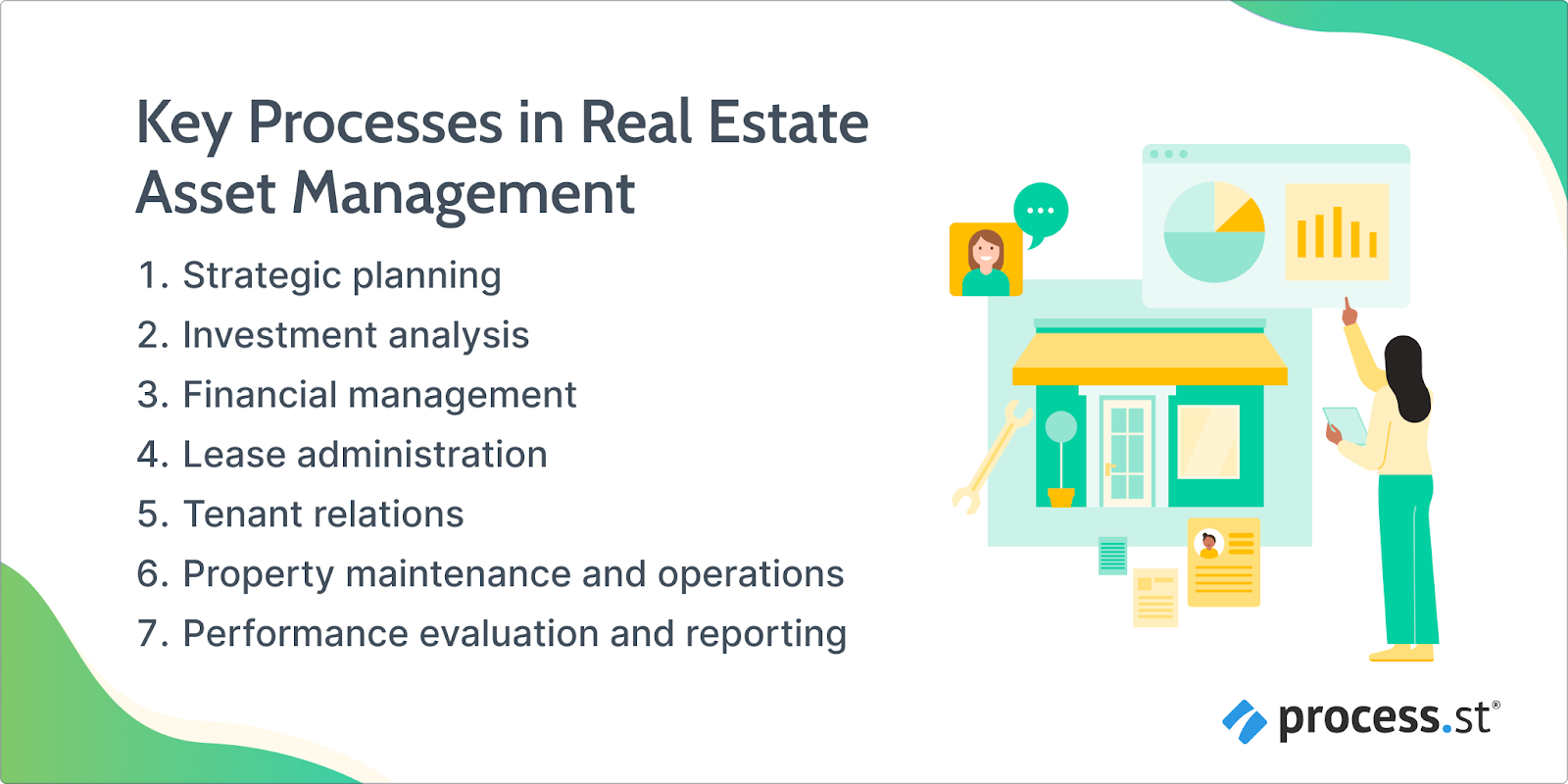
Real estate asset management is a complex field, requiring meticulous oversight of properties to maximize value and returns.
To streamline these intricate processes, many firms leverage specialized templates that standardize key activities like property management, financial reporting, and tenant relations. These templates not only enhance operational efficiency but also ensure consistency and accuracy across the portfolio.
Whether you’re managing a single property or an extensive real estate portfolio, having the right templates in place can make a significant difference in performance and profitability.
In this article, we’ll explore essential real estate asset management processes and the templates that simplify them. We’ll cover:
- Understanding real estate assets
- Types of real estate assets
- The role of a real estate asset manager
- Key processes in real estate asset management
- Real estate asset management processes for development
- Real estate asset management processes for onboarding
- Real estate asset management processes for private equity
- Real estate asset management processes for quality control
- Real estate asset management processes for sales
- Real estate asset management processes for property management
Understanding real estate assets
Real estate assets represent some of the most significant investments individuals and institutions can make. Unlike stocks or bonds, real estate portfolios comprise physical property that can provide both income and potential appreciation in value over time. That’s the primary goal, at least. Understanding the nuances of real estate assets is essential for investors, property owners, and anyone looking to navigate the complexities of the real estate market.
The value of real estate assets
The value of real estate assets is influenced by multiple factors, including location, market conditions, and property conditions. A property’s location is often considered the most critical attribute, as it affects desirability, accessibility, and potentially the growth of surrounding areas. Additionally, the real estate market is cyclical, with fluctuations that impact property values and rental income.
Real estate can also serve as a hedge against inflation, as property values and rents usually appreciate over time. This characteristic makes real estate an attractive component of a diversified investment portfolio. However, investors must also consider the potential for downturns and the associated risks, such as market volatility, economic shifts, and changes in interest rates.
Maintenance and management
Owning real estate assets requires ongoing management and maintenance. Effective property management involves ensuring that properties are well-maintained, addressing tenant needs promptly, and managing financial aspects, such as rent collection and budget allocation for repairs.
For many investors, hiring a professional property management company can alleviate some of the burdens associated with day-to-day management, especially for those with multiple properties.
Types of real estate assets

Real estate is a diverse investment category, encompassing various asset types that cater to different investment strategies, risk appetites, and financial goals. Understanding these types can help investors make informed decisions and optimize their portfolios. Here’s a look at the primary classifications of real estate assets:
Residential real estate
Residential real estate includes properties designed for people to live in, such as single-family homes, condominiums, townhouses, and multi-family units. This category often attracts individual buyers and real estate investors/property managers looking for rental income.
The residential market typically responds to economic conditions, with demand often influenced by interest rates, job growth, and demographic trends. Mortgages and rental rates generally trend upward, however.
Commercial real estate
Commercial real estate encompasses properties used primarily for business purposes and often has longer lease terms than residential properties. This category is further divided into several sub-types, including:
- Office buildings: Structures that house businesses, ranging from small firms to large corporations.
- Retail spaces: Locations for stores, restaurants, and service providers, typically situated in shopping centers or high-traffic areas.
- Industrial properties: Warehouses, manufacturing plants, and distribution centers that support production and logistics operations.
- Mixed-use developments: Properties that combine residential, commercial, and sometimes industrial components to create vibrant, multifunctional communities.
Investors in commercial properties must understand market demand, zoning laws, and tenant needs to maximize their investment returns.
Industrial real estate
This asset type focuses on properties used for production, storage, and distribution. With the rise of e-commerce, industrial real estate has gained traction as demand for logistics facilities, warehouses, and fulfillment centers continues to surge. These properties typically require significant capital investment but can yield high returns, especially as online retail evolves.
Self-storage facilities
Self-storage facilities are increasingly popular as urban living spaces shrink and mobility increases. They provide individuals and businesses with a space to store their belongings, often on short-term leases. This type of asset can offer a hands-off investment opportunity with relatively low overhead costs and steady demand.
Special purpose real estate
This category includes unique properties designed for specific uses, such as hotels, hospitals, schools, and places of worship. Special purpose properties may come with unique challenges due to their specialized nature, but they can also offer higher returns if managed effectively.
Raw land
Investing in raw land involves purchasing undeveloped parcels. This can be a speculative move, as land can appreciate significantly over time, especially if it is located in areas slated for development. However, raw land typically offers no immediate cash flow and carries its own risks, such as zoning changes and environmental regulations.
REITs (real estate investment trusts)
These investment vehicles allow individuals to invest in real estate without having to purchase physical property. REITs own, operate, or finance income-generating real estate across a range of property sectors, providing investors with dividends and liquidity.
The role of a real estate asset manager
A real estate asset manager’s primary responsibility is to oversee a portfolio of properties, whether residential, commercial, or industrial, ensuring that each asset aligns with the overall investment goals set by the owner or stakeholder.
This requires a keen understanding of:
- Market dynamics,
- Financial analysis, and
- Strategic planning.
By leveraging data on market conditions, tenant behavior, and property performance metrics, asset managers craft tailored strategies that enhance both short-term revenues and long-term asset appreciation.
Financial stewardship is at the heart of an asset manager’s role. They meticulously track income, expenses, operating costs, and overall financial performance, often preparing regular reports to keep stakeholders informed. Budgeting, forecasting, and financial modeling are critical components of their work, enabling them to make informed decisions about:
- Renovations
- Marketing strategies
- Potential divestitures
Furthermore, a successful asset manager must possess strong negotiation skills, as they frequently interact with a range of stakeholders, including:
- Tenants
- Contractors
- Brokers
Whether negotiating lease terms or overseeing property management teams, their ability to maintain positive relationships while advocating for the owner’s interests is essential.
In addition to financial acumen and negotiation prowess, effective asset management also focuses on enhancing property value through operational efficiency and strategic improvements. This can involve identifying opportunities for capital improvements, implementing sustainability initiatives, and ensuring compliance with local regulations.
Key processes in real estate asset management

Real estate asset management is a multifaceted process that encompasses several key functions that work harmoniously to enhance property performance and generate consistent returns on investment for stakeholders.
Below are some of the essential processes involved in effective real estate asset management.
Strategic planning and investment analysis
The foundation of successful asset management lies in strategic planning and thorough investment analysis. Asset managers continuously assess market conditions, economic trends, and demographic shifts to identify opportunities for asset enhancement and value creation.
This involves conducting detailed feasibility studies and risk assessments to inform investment decisions. Such analysis aids in defining clear investment objectives and developing long-term strategies that align with the overall vision of the portfolio.
Financial management
Financial management is a cornerstone of real estate asset management, focusing on budgeting, forecasting, and performance monitoring. Asset managers create and manage budgets that cover operating expenses, capital expenditure, and reserves for future improvements.
Regular financial reporting allows for the tracking of key performance indicators (KPIs), such as cash flow, ROI, and net operating income (NOI). This data-driven approach empowers managers to make informed financial decisions and optimize fiscal performance.
Lease administration and tenant relations
Effective lease administration is crucial for maintaining property cash flow and enhancing tenant satisfaction. Asset managers oversee lease agreements, ensure compliance with terms, and renegotiate leases when necessary to reflect market conditions.
Building strong relationships with tenants fosters a positive environment, encouraging lease renewals and minimizing vacancy rates. Engaging with tenants through regular communication and addressing their needs promptly can lead to longer tenancies and increased retention.
Property maintenance and operations
Operational efficiency is key to preserving and increasing the value of real estate assets. Asset managers coordinate property maintenance, ensuring that buildings are well-maintained and comply with safety and regulatory standards.
This encompasses routine inspections, repairs, and upgrades, along with managing vendor relationships and service contracts. By implementing preventive maintenance programs, asset managers can reduce long-term costs and enhance the overall tenant experience.
Performance evaluation and reporting
Regular performance evaluation is integral to the asset management process. Asset managers analyze portfolio performance against industry benchmarks and investor expectations, using comprehensive reporting systems to communicate results with stakeholders.
By measuring outcomes against strategic objectives, managers can identify areas for improvement, adapt strategies, and drive accountability across the portfolio.
Real estate asset management processes for development
Real estate asset management firms use development process templates to standardize project planning, execution, and monitoring. These templates guide teams through key phases such as setting principles, budgeting, and business plans.
By ensuring consistency and thoroughness, templates help streamline operations, reduce errors, and enhance project outcomes across the firm’s portfolio.
Here’s a real estate development process template pack:
- Real Estate Development Process
- Land Development Process
- Real Estate Development Process Flowchart
- Real Estate Development Principles and Process
- Commercial Real Estate Development Process
- Affordable Housing Development Process
- Real Estate Development Process Step-by-Step PDF
- Condominium Development Process
- Airbnb Development Process
- Real Estate Development Budget Template
- Real Estate Development Business Plan Template
Real estate asset management processes for onboarding
Real estate asset management firms utilize various onboarding processes, including client onboarding, broker onboarding, and tenant onboarding. Each process is tailored to optimize management and performance so operations run smoothly and new employees and clients feel welcome and informed.
Here is a real estate asset management onboarding template pack:
- Real Estate Agent Onboarding Process
- Keller Williams Onboarding Process
- Exp Realty Onboarding Process
- Tenant Onboarding Process
- Property Management Real Estate Paralegal Onboarding
- Family Office Real Estate Investment Associate Onboarding
- Real Estate Appraiser Onboarding
- Real Estate Banking Analyst OnboardingReal Estate Banking Analyst Onboarding
- Real Estate Broker Onboarding
- Real Estate Investment Analyst Onboarding
Real estate asset management processes for private equity
Real estate asset management processes for private equity involve strategic oversight of property investments, including acquisition, value enhancement, and eventual disposition.
Key activities include:
- Financial analysis
- Tenant management
- Lease negotiations
- Property maintenance
These processes aim to maximize asset value and returns, aligning with the private equity firm’s broader investment strategy.
Here is a real estate private equity firm template pack:
- Real Estate Private Equity Firm Property Acquisition Process
- Real Estate Private Equity Firm Real Estate Development Process
- Real Estate Private Equity Firm Lease Management Process
- Real Estate Private Equity Firm Tenant Relations Process
- Real Estate Private Equity Firm Property Valuation Process
- Real Estate Private Equity Firm Asset Repositioning Process
- Real Estate Private Equity Firm Real Estate Market Analysis Process
- Real Estate Private Equity Firm Zoning and Permitting Process
- Real Estate Private Equity Firm Property Management Oversight Process
- Real Estate Private Equity Firm Real Estate Exit Strategies Process
Real estate asset management processes for quality control
Real estate asset management firms use quality control templates to ensure consistency and excellence in property management. These templates standardize inspections, maintenance schedules, and compliance checks, helping teams systematically evaluate asset conditions.
By using these templates, firms can identify issues early, maintain high property standards, and enhance overall portfolio performance.
Here is a real estate asset management quality control template pack:
- Mortgage Quality Control Checklist PDF
- Mortgage Broker Quality Control Plan Template Free
- Single Family House Quality Control Checklist Template
- Quality Control and Procedures TRID Template PDF
- Fannie Mae Quality Control Checklist
- FHA Quality Control Checklist
- Appraisal Quality Control Checklist
Real estate asset management processes for sales
Sales processes for real estate asset management firms involve marketing properties, negotiating deals, and closing transactions. These processes include creating sales agreements and closing on properties.
Efficient sales processes help maximize asset value, ensure timely transactions, and align with the firm’s overall investment objectives, driving successful outcomes for the portfolio.
Here is a real estate sales template pack:
- Purchase and Sales Agreement Template
- Property Sales Agreement Template
- Real Estate Sales Contract Template
- Real Estate Closing Checklist Template
- Land Sales Contract Template
- Real Estate Installment Sales Contract Template
- Residential Real Estate Transaction Management Template
- Real Estate Balance Sheet Template
- Commercial Property Management Agreement Template
Real estate asset management processes for property management
Real estate asset management firms use property management templates to standardize operations, including tenant communication, lease management, maintenance tracking, and financial reporting. These templates ensure consistency, streamline daily tasks, and improve efficiency across the portfolio.
By utilizing structured templates, firms enhance property performance, reduce errors, and maintain high management standards.
- Property Management Template
- Property Management Agreement Template
- Property Management Invoice Template
- Property Management Report Template
- Property Management Plan Template
- Terminate Property Management Agreement Template
- Property Management Proposal Template
- Property Management Spreadsheet Template
- Property Management Work Order Template
- Property Management Policies and Procedures Template
- Property Management Profit and Loss Statement Template
Give real estate asset management process templates a try
Including these structured real estate asset management process templates in an organization is a game-changer for improving the operations and outcomes of mission-driven investments.
These templates not only improve operational consistency and efficiency but also enhance decision-making, client and tenant relationships, risk mitigation, collaboration, scalability, and portfolio management.
By adopting these tools, real estate investors can streamline their processes, reduce errors, and focus more on strategic activities that maximize both financial returns and positive social or environmental impacts. So give them a try today! Why wait?
The post The Best Real Estate Asset Management Processes to Optimize Efficiency first appeared on Process Street | Process & Project Management Software.
0 Commentaires